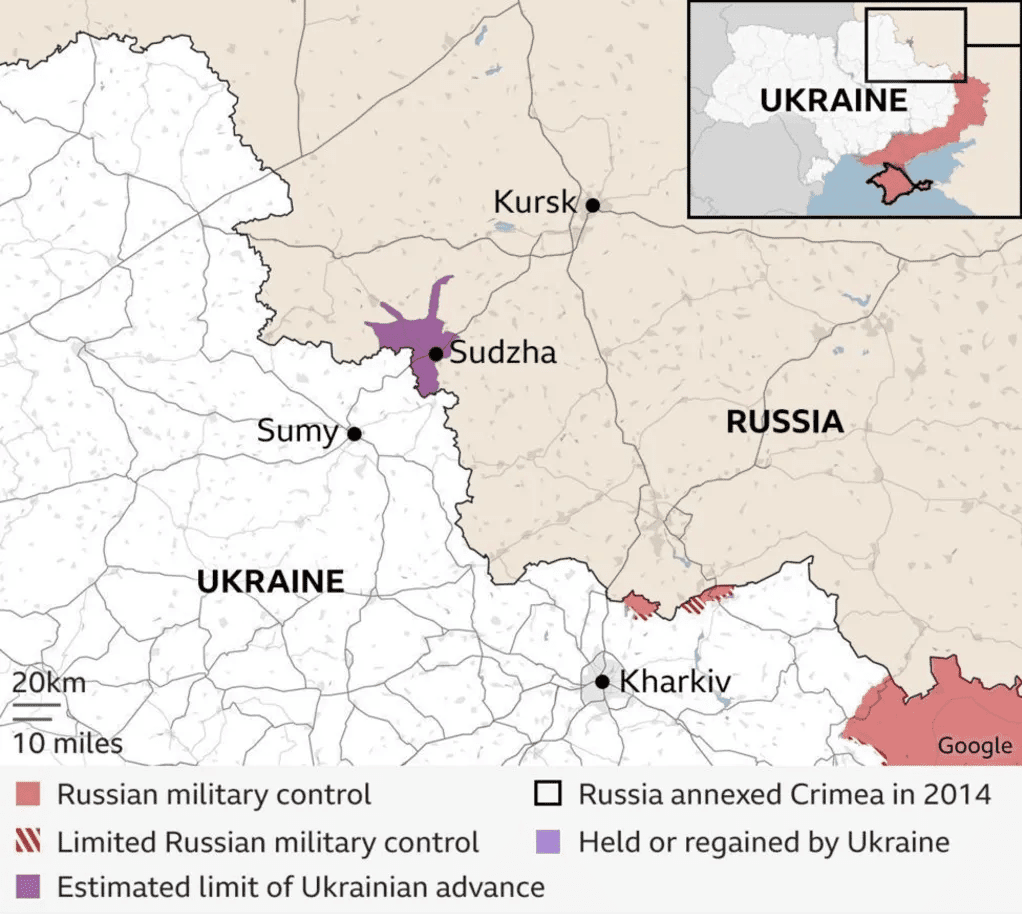After days of silence, President Zelensky confirmed on Saturday night what the world already knew via stunned and angry Russian sources: thousands of Ukrainian troops have made a surprise push into Russian territory (Kursk).
Zelensky says it’s all to “restore justice” and “push the war out into the aggressor’s territory.” But it leaves us with a couple of questions.
First, how much does this really matter? It’s early, but here are just two of the accurate and yet wildly diverging descriptions you could use in an answer:
Stay on top of your world from inside your inbox.
Subscribe for free today and receive way much more insights.
Trusted by 145,000+ subscribers
No spam. No noise. Unsubscribe any time.
- Ukraine has seized just 0.002% of Russia, while Russia controls 20% of Ukraine, and yet…
- It’s the first ‘invasion’ of Russia since WWII, with Ukrainian troops in Russia now closer to Moscow than Russia’s occupying troops are to Kyiv.
Meanwhile, Russia’s responses – denial, distortion, distraction, and threats – leave clear it was caught off guard. And that makes it a little tougher to answer our second question: what does Ukraine hope to achieve here?
Ukraine has stayed tight-lipped, but here are some of the more credible theories:
- To punish or pre-empt?
Zelensky himself says Russia has attacked Ukraine 2,000 times this summer from the Kursk region, which warrants a response. There were also reports Russia was planning a push from Kursk into Ukraine’s neighbouring Sumy region.
- To distract or dilute?
Ukraine could also be hoping to draw Russian troops away from Ukraine’s east, where Russia is still grinding forward in return for 30,000 casualties a month. Or…
- To build leverage?
As speculation lingers that Ukraine’s wary allies could push it to trade its own land for peace after the US elections, Ukraine could now be yoinking Russian territory and prisoners to bolster its hand. Or maybe…
- To boost morale?
Ukraine is enjoying a mood bump right now and, in a battle of wills, that kind of lift has the capacity to shape battlefield performance and help address related challenges around recruitment, not to mention…
- To stiffen allies’ necks?
This push has captivated Western voters, media outlets, and governments. And that’s critical so long as Ukraine’s defence relies on Western support, which still ebbs and flows as a campaign issue in the US and beyond. Then what about…
- To demoralise and destabilise?
Russian media outlets usually toe the Kremlin line, but some are now reporting anger among the ~75,000 Russians fleeing their homes, while other outlets are quoting anonymous elites on how humiliating this is for Putin and his circle.
It all erodes Russians’ trust in Putin, Putin’s trust in his state, and his state’s limited trust between its own factions. Meanwhile, could it also be…
- To flip the script?
Ukrainians are already relishing turning Russia’s rhetoric back on Russia, like:
- Shouldn’t Russia now give up Kursk to secure peace?
- Doesn’t the lack of resistance mean Kursk folks want to join Ukraine?
- Isn’t this Ukraine’s sphere of influence, warranting a buffer inside Russia?
- And crucially, what about all those threats of Russian ‘escalation’? (Russia is for now responding the same as always: by attacking Ukraine’s cities).
And finally…
- A Hail Mary?
Last year’s Wagner mutiny revealed the chaos that can erupt when the pot really gets stirred within Russia. So maybe Ukraine, facing Russia’s grinding war of attrition at home plus hints of Western fatigue abroad, opted for a Hail Mary?
If that’s the play, it could be a sign of weakness rather than strength. But ultimately, it all really depends on what happens next.
INTRIGUE’S TAKE
Ukraine’s progress seems to have slowed, but it’s unclear if that’s because of Russian resistance, Ukraine’s pivot to solidify its gains, or a reluctance to stretch its own supply lines.
But there are reports now emerging that Ukraine is pushing into additional Russian turf (Belgorod), while digging trenches to fortify its gains in Kursk.
And this all hints that it could take a while to unwind, potentially putting several Ukrainian brigades in a tough spot to defend their gains longer term, but also leaving more time for any internal Russian divisions to metastasize.





